六年级英语上册第五单元知识点汇总
- 格式:docx
- 大小:18.21 KB
- 文档页数:3
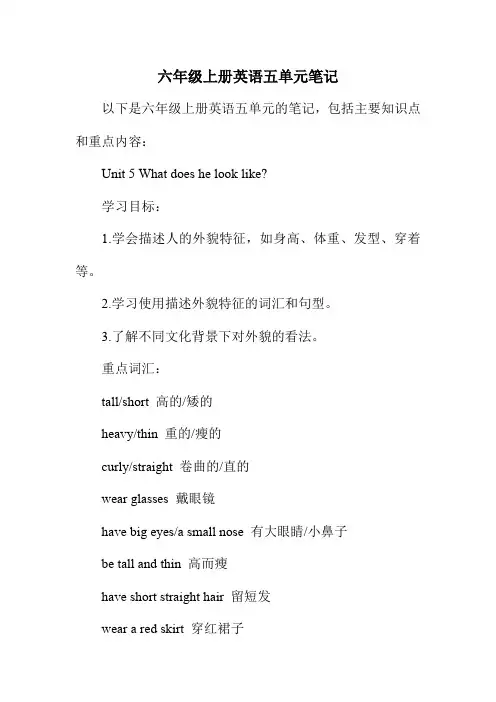
六年级上册英语五单元笔记以下是六年级上册英语五单元的笔记,包括主要知识点和重点内容:Unit 5 What does he look like?学习目标:1.学会描述人的外貌特征,如身高、体重、发型、穿着等。
2.学习使用描述外貌特征的词汇和句型。
3.了解不同文化背景下对外貌的看法。
重点词汇:tall/short 高的/矮的heavy/thin 重的/瘦的curly/straight 卷曲的/直的wear glasses 戴眼镜have big eyes/a small nose 有大眼睛/小鼻子be tall and thin 高而瘦have short straight hair 留短发wear a red skirt 穿红裙子重点句型:1.What does he/she look like? 他/她长得什么样?2.He/She is tall/short. 他/她是高/矮的。
3.He/She has long/short hair. 他/她留长/短发。
4.He/She is thin/heavy. 他/她瘦/胖。
5.He/She has big/small eyes. 他/她眼睛大/小。
6.He/She wears glasses. 他/她戴眼镜。
7.He/She is wearing a red skirt today. 他/她今天穿红裙子。
语法点:1.使用“have”或“has”表示拥有某物或某人具有某种特征。
2.使用形容词描述人的外貌特征。
3.使用“wear”表示穿戴某物。
4.使用“today”表示当前时间。
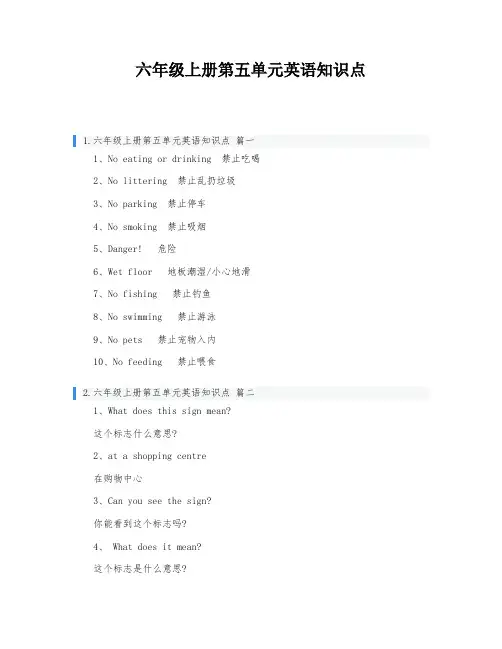
六年级上册第五单元英语知识点1.六年级上册第五单元英语知识点篇一1、No eating or drinking 禁止吃喝2、No littering 禁止乱扔垃圾3、No parking 禁止停车4、No smoking 禁止吸烟5、Danger! 危险6、Wet floor 地板潮湿/小心地滑7、No fishing 禁止钓鱼8、No swimming 禁止游泳9、No pets 禁止宠物入内10、No feeding 禁止喂食2.六年级上册第五单元英语知识点篇二1、What does this sign mean?这个标志什么意思?2、at a shopping centre在购物中心3、Can you see the sign?你能看到这个标志吗?4、 What does it mean?这个标志是什么意思?5、It means the floor is wet.它意思是地板是湿的。
6、see a juice shop看见一家果汁店7、Do you want some juice?你们想要一些果汁吗?8、want some juice想要一些果汁3.六年级上册第五单元英语知识点篇三What a great job!多么好的一份动作啊!感叹句通常有what, how引导,表示赞美、惊叹、喜悦、等感情。
what修饰名词,how 修饰形容词,副词或动词,感叹句结构主要有以下几种:(1)、由What引导的感叹句。
其结构为:What+a(an)+形容词+名词+(主语+谓语)可省略,如:What an interesting story it is !多有趣的故事啊!What a lovely day it is!多好的天气啊!What interesting books they are!多有趣的书啊!What bad weather it is!多坏的天气啊!What a beautiful girl!多漂亮的女孩啊!在口语中,这类感叹句有时常省略主语和谓语,如:What a big fish!多大的一条语啊What a pretty girl!多秀丽的女孩啊!What a beautiful bird!多么漂亮的一只鸟啊!。
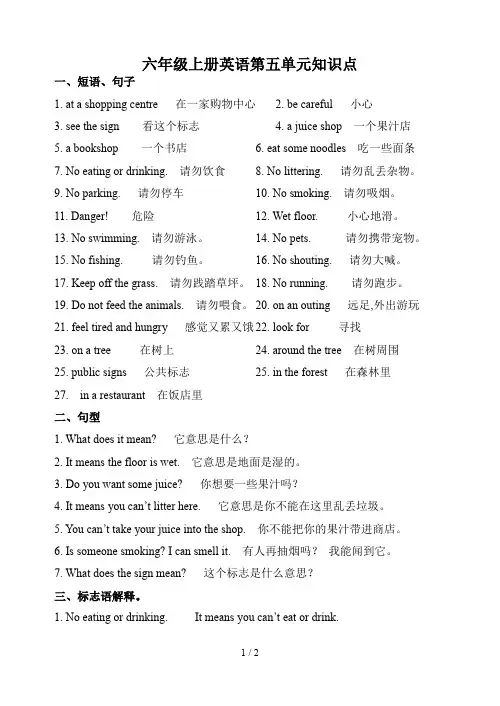
六年级上册英语第五单元知识点一、短语、句子1. at a shopping centre 在一家购物中心2. be careful 小心3. see the sign 看这个标志4. a juice shop 一个果汁店5. a bookshop 一个书店6. eat some noodles 吃一些面条7. No eating or drinking. 请勿饮食8. No littering. 请勿乱丢杂物。
9. No parking. 请勿停车10. No smoking. 请勿吸烟。
11. Danger! 危险 12. Wet floor. 小心地滑。
13. No swimming. 请勿游泳。
14. No pets. 请勿携带宠物。
15. No fishing. 请勿钓鱼。
16. No shouting. 请勿大喊。
17. Keep off the grass. 请勿践踏草坪。
18. No running. 请勿跑步。
19. Do not feed the animals. 请勿喂食。
20. on an outing 远足,外出游玩21. feel tired and hungry 感觉又累又饿 22. look for 寻找23. on a tree 在树上24. around the tree 在树周围25. public signs 公共标志25. in the forest 在森林里27. in a restaurant 在饭店里二、句型1. What does it mean? 它意思是什么?2. It means the floor is wet. 它意思是地面是湿的。
3. Do you want some juice? 你想要一些果汁吗?4. It means you can’t litter here. 它意思是你不能在这里乱丢垃圾。
5. You can’t take your juice into the shop. 你不能把你的果汁带进商店。
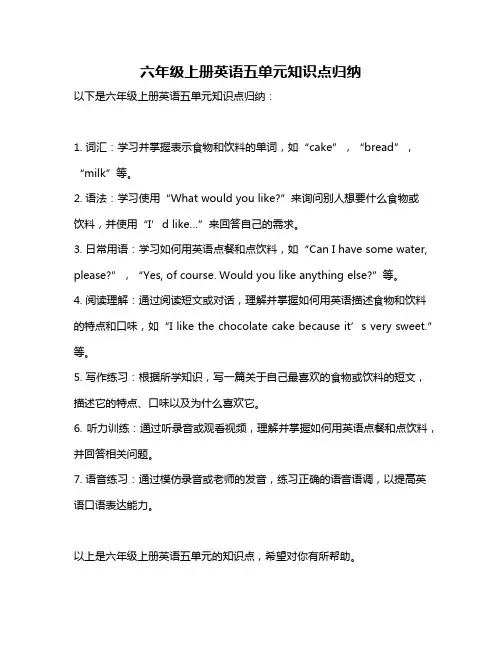
六年级上册英语五单元知识点归纳
以下是六年级上册英语五单元知识点归纳:
1. 词汇:学习并掌握表示食物和饮料的单词,如“cake”,“bread”,“milk”等。
2. 语法:学习使用“What would you like?”来询问别人想要什么食物或
饮料,并使用“I’d like…”来回答自己的需求。
3. 日常用语:学习如何用英语点餐和点饮料,如“Can I have some water, please?”,“Yes, of course. Would you like anything else?”等。
4. 阅读理解:通过阅读短文或对话,理解并掌握如何用英语描述食物和饮料的特点和口味,如“I like the chocolate cake because it’s very sweet.”等。
5. 写作练习:根据所学知识,写一篇关于自己最喜欢的食物或饮料的短文,描述它的特点、口味以及为什么喜欢它。
6. 听力训练:通过听录音或观看视频,理解并掌握如何用英语点餐和点饮料,并回答相关问题。
7. 语音练习:通过模仿录音或老师的发音,练习正确的语音语调,以提高英语口语表达能力。
以上是六年级上册英语五单元的知识点,希望对你有所帮助。
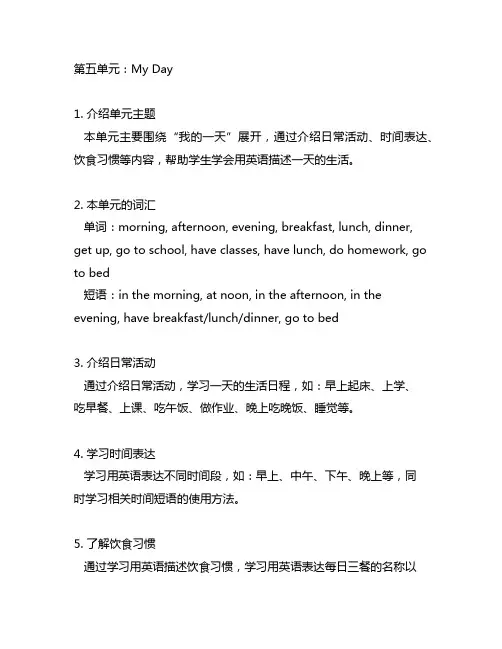
第五单元:My Day1. 介绍单元主题本单元主要围绕“我的一天”展开,通过介绍日常活动、时间表达、饮食习惯等内容,帮助学生学会用英语描述一天的生活。
2. 本单元的词汇单词:morning, afternoon, evening, breakfast, lunch, dinner, get up, go to school, have classes, have lunch, do homework, go to bed短语:in the morning, at noon, in the afternoon, in the evening, have breakfast/lunch/dinner, go to bed3. 介绍日常活动通过介绍日常活动,学习一天的生活日程,如:早上起床、上学、吃早餐、上课、吃午饭、做作业、晚上吃晚饭、睡觉等。
4. 学习时间表达学习用英语表达不同时间段,如:早上、中午、下午、晚上等,同时学习相关时间短语的使用方法。
5. 了解饮食习惯通过学习用英语描述饮食习惯,学习用英语表达每日三餐的名称以及相关用餐动作。
6. 总结通过本单元的学习,学生能够掌握日常活动的英语表达、时间表达以及饮食习惯的英语表达,为日常生活中的英语交流打下坚实基础。
通过本文章的介绍,学生能够了解到本单元的主要内容和重点,以便更好地进行学习和复习,同时也能帮助老师和家长更好地指导和辅导学生的学习。
7. 吸收生活常识在学习“我的一天”的过程中,学生不仅能够学会用英语描述日常活动,还能够借此了解更多关于日常生活的常识。
他们可以了解到不同国家和地区的人们在早餐、午餐和晚餐中喜欢吃些什么样的食物,从而拓宽他们的视野,增加他们对不同文化的认识。
在学习中,老师可以通过图片、视瓶或真实情境的模拟等方式,让学生更直观地了解不同文化下的生活方式,从而培养他们的跨文化意识和包容心。
8. 提高日常生活的英语交流能力通过学习这些关于日常生活的词汇和短语,学生可以在语言环境中更流利地描述自己的一天。
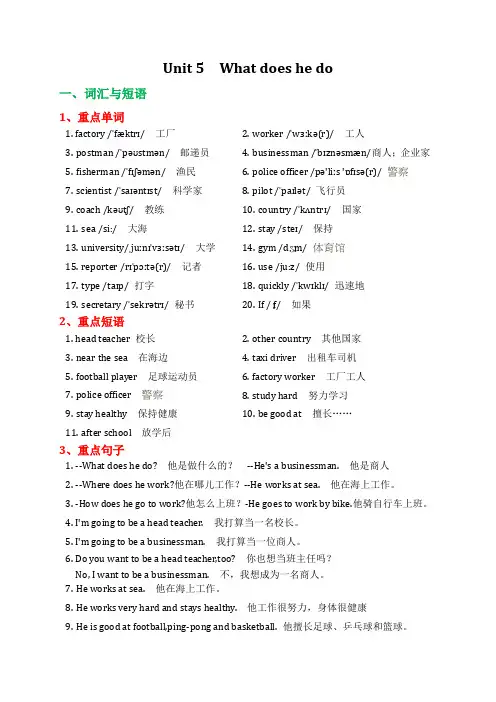
Unit 5 What does he do一、词汇与短语1、重点单词1. factory /ˈfæktrɪ/ 工厂2.worker /ˈwɜːkə(r)/ 工人3.postman /ˈpəʊstmən/ 邮递员4.businessman /ˈbɪznəsmæn/商人;企业家5.fisherman /ˈfɪʃəmən/ 渔民6.police officer /pə'liːs 'ɒfɪsə(r)/ 警察7.scientist /ˈsaɪəntɪst/ 科学家8.pilot /ˈpaɪlət/ 飞行员9.coach /kəʊtʃ/ 教练10.country /ˈkʌntrɪ/ 国家11.sea /si:/ 大海12.stay /steɪ/ 保持13.university/ˌjuːnɪˈvɜːsətɪ/ 大学14.gym /dʒɪm/ 体育馆15.reporter /rɪˈpɔːtə(r)/ 记者e /ju:z/ 使用17.type /taɪp/ 打字18.quickly /ˈkwɪklɪ/ 迅速地19.secretary /ˈsekrətrɪ/ 秘书20.If /ɪf/ 如果2、重点短语1. head teacher 校长2.other country 其他国家3.near the sea 在海边4.taxi driver 出租车司机5.football player 足球运动员6.factory worker 工厂工人7.police officer 警察8.study hard 努力学习9.stay healthy 保持健康10.be good at 擅长……11.after school 放学后3、重点句子1. --What does he do? 他是做什么的?--He's a businessman. 他是商人2. --Where does he work?他在哪儿工作?--He works at sea. 他在海上工作。
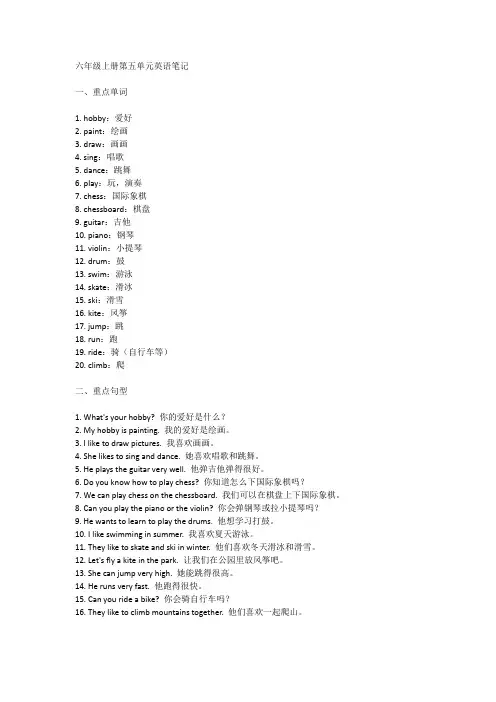
六年级上册第五单元英语笔记一、重点单词1. hobby:爱好2. paint:绘画3. draw:画画4. sing:唱歌5. dance:跳舞6. play:玩,演奏7. chess:国际象棋8. chessboard:棋盘9. guitar:吉他10. piano:钢琴11. violin:小提琴12. drum:鼓13. swim:游泳14. skate:滑冰15. ski:滑雪16. kite:风筝17. jump:跳18. run:跑19. ride:骑(自行车等)20. climb:爬二、重点句型1. What's your hobby? 你的爱好是什么?2. My hobby is painting. 我的爱好是绘画。
3. I like to draw pictures. 我喜欢画画。
4. She likes to sing and dance. 她喜欢唱歌和跳舞。
5. He plays the guitar very well. 他弹吉他弹得很好。
6. Do you know how to play chess? 你知道怎么下国际象棋吗?7. We can play chess on the chessboard. 我们可以在棋盘上下国际象棋。
8. Can you play the piano or the violin? 你会弹钢琴或拉小提琴吗?9. He wants to learn to play the drums. 他想学习打鼓。
10. I like swimming in summer. 我喜欢夏天游泳。
11. They like to skate and ski in winter. 他们喜欢冬天滑冰和滑雪。
12. Let's fly a kite in the park. 让我们在公园里放风筝吧。
13. She can jump very high. 她能跳得很高。
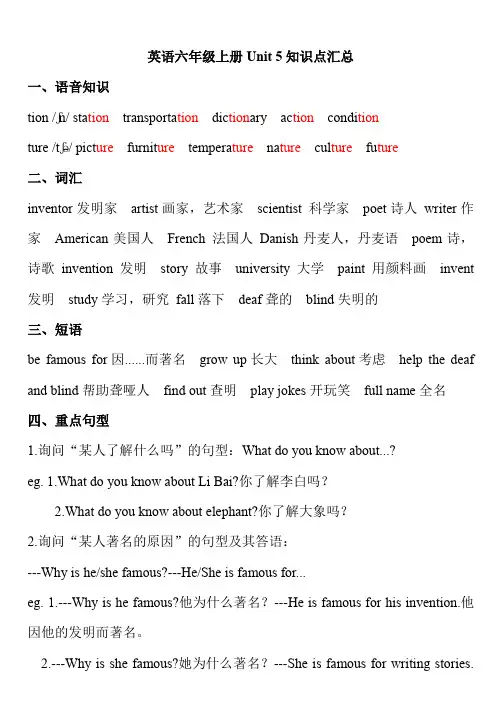
英语六年级上册Unit 5知识点汇总一、语音知识tion /ʃn/ sta tion transporta tion dic tion ary ac tion condi tionture /tʃə/ pict ure furnit ure tempera ture na ture cul ture fu ture二、词汇inventor发明家artist画家,艺术家scientist 科学家poet诗人writer作家American美国人French 法国人Danish丹麦人,丹麦语poem诗,诗歌invention发明story故事university大学paint 用颜料画invent 发明study学习,研究fall落下deaf聋的blind失明的三、短语be famous for因......而著名grow up长大think about考虑help the deaf and blind帮助聋哑人find out查明play jokes开玩笑full name全名四、重点句型1.询问“某人了解什么吗”的句型:What do you know about...?eg. 1.What do you know about Li Bai?你了解李白吗?2.What do you know about elephant?你了解大象吗?2.询问“某人著名的原因”的句型及其答语:---Why is he/she famous?---He/She is famous for...eg. 1.---Why is he famous?他为什么著名?---He is famous for his invention.他因他的发明而著名。
2.---Why is she famous?她为什么著名?---She is famous for writing stories.她因写故事而著名。
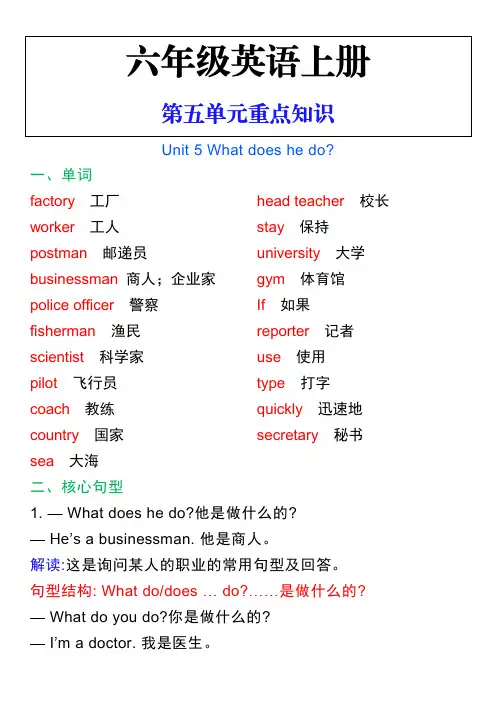
Unit 5 What does he do?一、单词factory工厂worker 工人postman邮递员businessman 商人;企业家police officer 警察fisherman渔民scientist 科学家pilot飞行员coach 教练country 国家sea 大海head teacher 校长stay 保持university大学gym体育馆If 如果reporter记者use 使用type 打字quickly 迅速地secretary 秘书二、核心句型1. — What does he do?他是做什么的?—He’s a businessman. 他是商人。
解读:这是询问某人的职业的常用句型及回答。
句型结构: What do/does …do?……是做什么的? — What do you do?你是做什么的?—I’m a doctor. 我是医生。
拓展:问职业还可以用“What’s sb?”来询问。
—What’s your mother?你妈妈是做什么的?— She is an accountant.她是会计。
2. Where does he work?他在哪儿工作?解读:这是常见的询问某人工作地点的句型。
句型结构: Where do/does … work? ……在哪儿工作?— Where does Mike work?迈克在哪儿工作?— He works in a bank. 他在一家银行工作。
3. How does he go to work?他怎么去上班?解读:这是询问他人乘什么交通工具的句型。
句型结构: How do/does … go to work?……怎么去上班?— How does Amy go to work?埃米怎么去上班?— She goes to work on foot. 她步行去上班。
三、了解句型1. Is your father here today?你爸爸今天来了吗?2. Do you want to be a head teacher too?你也想成为校长吗? 句型结构:Do/Does+主语+want to be+职业名词?…想成为…吗举一反三: Do you want to be a pilot?你想成为飞行员吗?3. What does Xiao Yu’s uncle look like?肖雨的叔叔长什么样? 句型结构: What+do/does+主语+look like?……长什么样?举一反三:— What does your sister look like?你姐姐长什么样?— She is tall and thin. 她又高又瘦。
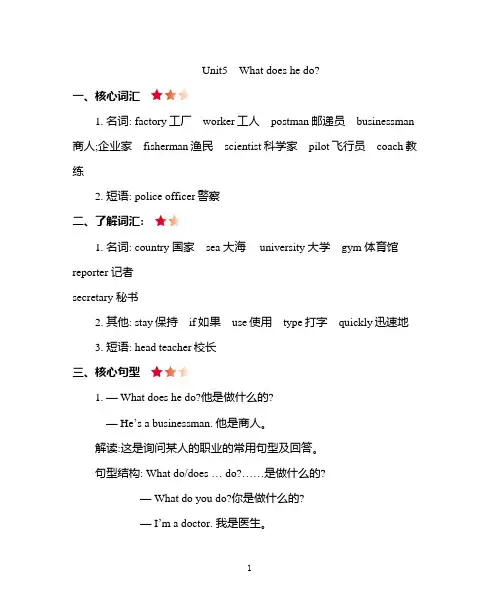
Unit5What does he do?一、核心词汇1. 名词: factory工厂worker工人postman邮递员businessman 商人;企业家fisherman渔民scientist科学家pilot飞行员coach教练2. 短语: police officer警察二、了解词汇:1. 名词: country 国家sea 大海 university 大学gym 体育馆reporter 记者secretary 秘书2. 其他: stay保持if如果use使用type打字quickly迅速地3. 短语: head teacher校长三、核心句型1. — What does he do?他是做什么的?— He’s a businessman. 他是商人。
解读:这是询问某人的职业的常用句型及回答。
句型结构: What do/does … do?……是做什么的?— What do you do?你是做什么的?— I’m a doctor. 我是医生。
— What does your father do?你爸爸是做什么的?— He is an engineer. 他是工程师。
拓展:问职业还可以用“What’s sb?”来询问。
— What’s your mother?你妈妈是做什么的?— She is an accountant.她是会计。
2. Where does he work?他在哪儿工作?解读:这是常见的询问某人工作地点的句型。
句型结构: Where do/does … work? ……在哪儿工作?— Where does Mike work?迈克在哪儿工作?— He works in a bank. 他在一家银行工作。
— Where does your father work?你爸爸在哪儿工作?— He works in a company. 他在一家公司工作。
3. How does he go to work?他怎么去上班?解读: 这是询问他人乘什么交通工具的句型。
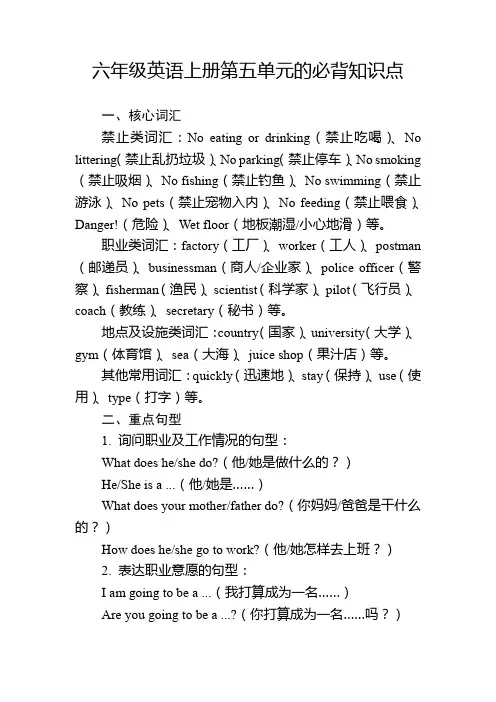
六年级英语上册第五单元的必背知识点一、核心词汇禁止类词汇:No eating or drinking(禁止吃喝)、No littering(禁止乱扔垃圾)、No parking(禁止停车)、No smoking (禁止吸烟)、No fishing(禁止钓鱼)、No swimming(禁止游泳)、No pets(禁止宠物入内)、No feeding(禁止喂食)、Danger!(危险)、Wet floor(地板潮湿/小心地滑)等。
职业类词汇:factory(工厂)、worker(工人)、postman (邮递员)、businessman(商人/企业家)、police officer(警察)、fisherman(渔民)、scientist(科学家)、pilot(飞行员)、coach(教练)、secretary(秘书)等。
地点及设施类词汇:country(国家)、university(大学)、gym(体育馆)、sea(大海)、juice shop(果汁店)等。
其他常用词汇:quickly(迅速地)、stay(保持)、use(使用)、type(打字)等。
二、重点句型1. 询问职业及工作情况的句型:What does he/she do?(他/她是做什么的?)He/She is a ...(他/她是……)What does your mother/father do?(你妈妈/爸爸是干什么的?)How does he/she go to work?(他/她怎样去上班?)2. 表达职业意愿的句型:I am going to be a ...(我打算成为一名……)Are you going to be a ...?(你打算成为一名……吗?)I want to be a ...(我想要成为一名……)3. 其他常用句型:Can you see the sign?(你能看到这个标志吗?)What does this sign mean?(这个标志是什么意思?)Do you want some juice?(你们想要一些果汁吗?)三、语法知识一般现在时:用于描述经常性、习惯性或现在的状态。
六年级上册英语第五单元知识点归纳一、重点单词:factory worker 工人postman 邮递员businessman 商人police officer 警察policeman男警察policewoman女警察fisherman 渔民scientist 科学家pilot飞行员coach 教练singer歌手writer作家TV reporter电视台记者actor男演员actress女演员artist画家teacher老师doctor医生nurse护士driver司机farmer农民cleaner 清洁工dancer舞者football player z足球运动员家庭成员单词father=dad 爸爸mother 妈妈sister 姐姐(妹妹)brother哥哥(弟弟)aunt 阿姨(姑姑)uncle叔叔(舅舅)cousin表(堂)姐(妹)/哥(弟)反义词:happy 快乐的——sad 悲伤的二、重点句子:1. What does your mother do? 你妈妈是做什么的?2. She is a TV reporter. 她是电视台记者。
3. Where does she work? She works in a car company. 她在哪工作?她在汽车公司工作。
4. How does she go to work? She goes to work by bus. 她怎样去工作?她坐公交车工作。
5. Is your father a postman ?你的爸爸是邮递员吗?Yes, he is . (是的,他是)No ,he isn’t.(不,他不是)6.Where does she work?她在哪里工作?She works at a university. 她在大学工作。
7. H e is good at playingfootball. 他擅长踢足球。
8. If you like sports, you can be a coach.如果你喜欢运动,你就有可能成为一名教练。
六年级英语上册(精通版)Unit 5 July is the seventh month.必备知识点六年级英语上册(精通版)Unit 5 "July is the seventh month" 的必备知识点主要包括月份的表达、节日的介绍以及相关句型结构。
以下是对这些知识点的详细归纳:一、月份的表达1. 七月至十二月的英文表达:July:七月August:八月September:九月October:十月November:十一月December:十二月2. 序数词与月份的结合:七月是一年中的第七个月:July is the seventh month of the year.八月是一年中的第八个月:August is the eighth month of the year.以此类推,可以表达九月至十二月:September is the ninth month of the year. October is the tenth month of the year. November is the eleventh month of the year. December is the twelfth month of the year.二、节日的介绍1. 中国的节日:建军节(Army Day):八月一日,纪念中国人民解放军的成立。
国庆节(National Day):十月一日,庆祝中华人民共和国的成立。
2. 美国的节日:感恩节(Thanksgiving Day):在美国,感恩节在十一月的第四个星期四庆祝。
3. 国际节日:圣诞节(Christmas):十二月二十五日,庆祝耶稣基督的诞生。
三、相关句型结构1. 询问月份:Which month is ...?例如:Which month is the birthday of the Communist Party of China? (中国共产党的生日是哪个月?)2. 描述月份与节日:... is the ... month of the year. ... is on ... (...是一年中的第...个月。
六上英语第五单元知识点六年级上册英语第五单元知识点总结一、单词subject 主题science 科学English 英语math 数学Chinese 语文PE 体育computer studies 计算机学习lunch 午餐morning assembly 早会music 音乐art 美术canteen 食堂after-school activities 课外活动homework 家庭作业class schedule 课程表free time 活动时间timetable 时间表二、词组What subjects do you like best? 你最喜欢哪些科目?I like English and Chinese best. 我最喜欢英语和语文。
What subjects do you dislike? 你最不喜欢哪些科目?I dislike math and science. 我不喜欢数学和科学。
When is the science class? 科学课是什么时候?It's on Tuesday and Thursday. 星期二和星期四。
What time is the English class? 英语课是什么时候?It's at 8:00 in the morning. 上午8点。
When is the music class? 音乐课是什么时候?It's on Monday and Wednesday. 星期一和星期三。
What's your favourite subject? 你最喜欢的科目是什么?My favourite subject is English. 我最喜欢的科目是英语。
I like English because it's interesting. 我喜欢英语因为它很有趣。
I don't like math because it's boring. 我不喜欢数学因为它很无聊。
六年级上册英语第五单元知识点笔记一、词汇1. 基本动词- watch (观看)- play (玩)- fly (飞行)2. 交通工具- car (汽车)- bus (公共汽车)- bike (自行车)3. 时间状语- in the morning (在早晨)- in the afternoon (在下午)- in the evening (在晚上)二、语法1. 现在进行时- 现在进行时用来表示正在进行的动作,例如:I am watching TV.(我正在看电视。
)2. 一般现在时- 一般现在时用来表示习惯性、经常性的动作,例如:My mother works in a hospital. (我妈妈在一家医院工作。
)3. 动词的第三人称单数形式- 在一般现在时中,第三人称单数的动词要加 -s,例如:He plays football every day. (他每天都踢足球。
)三、对话- 对话部分主要包括与交通工具相关的问答,例如:- A: How do you go home?- B: I go home by bus.四、练习题1. 选择题A. What is he doing?- A. He plays football.- B. He is playing football.- C. He play football.B. How does she go to school?- A. She go to school by bus.- B. She goes to school by bus.- C. She going to school by bus.2. 填空题- Lily _________ (watch) TV every evening.- They _________ (fly) kites in the park now.五、生活场景1. 交通工具的使用- 和同学、老师进行交流,共享自己乘坐的交通工具以及习惯。
Unit 5 What does he do一、词汇与短语1、重点单词1. factory /ˈfæktrɪ/ 工厂2.worker /ˈwɜːkə(r)/ 工人3.postman /ˈpəʊstmən/ 邮递员4.businessman /ˈbɪznəsmæn/商人;企业家5.fisherman /ˈfɪʃəmən/ 渔民6.police officer /pə'liːs 'ɒfɪsə(r)/ 警察7.scientist /ˈsaɪəntɪst/ 科学家8.pilot /ˈpaɪlət/ 飞行员9.coach /kəʊtʃ/ 教练10.country /ˈkʌntrɪ/ 国家11.sea /si:/ 大海12.stay /steɪ/ 保持13.university/ˌjuːnɪˈvɜːsətɪ/ 大学14.gym /dʒɪm/ 体育馆15.reporter /rɪˈpɔːtə(r)/ 记者e /ju:z/ 使用17.type /taɪp/ 打字18.quickly /ˈkwɪklɪ/ 迅速地19.secretary /ˈsekrətrɪ/ 秘书20.If /ɪf/ 如果2、重点短语1. head teacher 校长2.other country 其他国家3.near the sea 在海边4.taxi driver 出租车司机5.football player 足球运动员6.factory worker 工厂工人7.police officer 警察8.study hard 努力学习9.stay healthy 保持健康10.be good at 擅长……11.after school 放学后3、重点句子1. --What does he do? 他是做什么的?--He's a businessman. 他是商人2. --Where does he work?他在哪儿工作?--He works at sea. 他在海上工作。
人教六年级上册英语第五单元考点知识点汇总(单词.词组.句型)Unit 5单词1.职业:taxi driver出租车司机cleaner清洁工writer作家singer 歌唱家dancer 舞蹈家postman 邮递员football player足球运动员factory worker 工人businessman 商人businesswoman 女商人fisherman渔夫fisherwoman渔妇police officer警察policeman警察policewoman女警察scientist 科学家(an)artist一位艺术家pilot 飞行员coach教练teacher教师cook厨师farmer 农民doctor 医生nurse 护士reporter记者secretary秘书2.其他单词及考点country国家;乡村→(复数)countries head teacher 校长a university 一所大学sea大海→(同音词)see 看见fish鱼→(复数)fishuse使用→(现在分词)usingtype打字→(现在分词)typingquickly迅速地;快地→(反义)slowly慢地if 如果here这里→(对应词)there 那里there那里→(同音词)their他们的Unit 5句型1.What does he do?他是做什么的?= What is his job?2.What does your mother do?你妈妈是做什么的?=What’s your mother’s job?注:问职业的问句也是有两种,跟上个单元提问爱好一样,一定要注意是某人,还是某人的。
如果是某人,则用you;he;she;they,同时do也要做出相应的变化What does he do?What does she do?What does Amy do?What do you do ?如果是某人的:your;his;her;their,举例如下:例1:What’s your job?例2:What’s his job?例3:What’s her job?例4:What’s Amy’s job?问职业的答句都是:He is a ...She is a ...I am a ...3.be going to+动词原形的概念:表示将要发生的动作、安排、计划、决定或者打算的事情。
六年级英语上册第五单元知识点汇总六年级英语上册第五单元知识点汇总
Unit 5 What dose he do?
一、单元词汇
factory工厂 worker工人 postman邮递员businessman商人
pol警察 Fisherman渔民科学家 pilot飞行员coach 教练
country国家 head teacher校长 sea大海 stay保持(动词) university大学
gym体育馆 if如果记者 use使用(动词) type打字(动词)
quickly迅速地(副词) secretary秘书
二、Part A课文导入
Sarah:Is your faday?
Oliver:No. He’ s in Australia.
Sarah:What does he do?
Oliver:He’s a businessman. Hguarah:And what does youdo?
Oliver:She’s a head teaarah:That’liver:Yeah. She ’ll bday!
Sarah:Do you want to be a head teacher,too?
Oliver:No,I want to be a businessma、here,副词,意为“这里” ,其反义词为“there”那里,kids. Let’s gature park!孩子们,到这里来,我们一起去自然公园!
2、What does he do?他做什么的?
What do/does+主语+do?
这是用来询问职业的常用句型,意为“某人做什么的?” ,当主语为第三人称单数时,助动词用does。
其答语通常为:主语+be动词+ a/an +表示职业的名词。
例:——What does your father do?
——He is an a——What do you do?
——I am a basketball pla【拓展】询问职业还可以用句型“What+be动词+主语?”或“What+be动词
+sb’s job?”
What is your father?你爸爸做什么工作?(你爸爸是什么?)
What is you’s job? 你妈妈做什么工作?(你妈妈的工作是什么?)
3、she’ll bwill be, will 是“将会,将要”的意思,will+动词原形→will do sth,“将会做某事”will dwvening.
I will be a great sing英语里的will(将会),should(应该),can(可以)的语法用法完全一致,将它们全部理解成情态动词即可,情态动词后接动词原形!
4、Do you want to be a head teacher? 你想成为一名校长吗?
“want to do sth”
“be going to do sth”
(1)我想吃汉堡包→ I want to eat hamburg我
打算去吃汉堡包→ I am going to eat hamburg她想成为一名舞蹈员→ She wants to be a da她打算成为一
名舞蹈员→going to be a dancer。